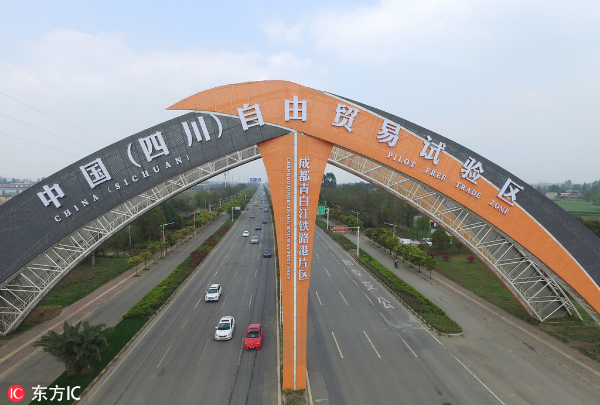Trade zones to grow, gain more latitude

Premier calls for areas for e-commerce, FTZs to contribute more to opening-up
Pilot free trade zones will be allowed to undertake more experiments with reform and opening-up, and the number of comprehensive zones for cross-border e-commerce will rise, as an effort to seek innovation in foreign trade growth, a State Council executive meeting chaired by Premier Li Keqiang decided on Wednesday.
"Pilot free trade zones have gathered a lot of good experience in the past six years since their launch. In particular, they have set an example in streamlining regulatory requirements and expanding opening-up," Li said. "There must be a stronger unity of purpose, supported by intensified efforts in this respect."
Meeting participants called for a speedy launch of new measures to support the pilot zones in achieving wider opening-up and innovation-driven development in line with high-standard international economic and trade rules.
Provincial and municipal governments will be urged to delegate more provincial administrative authority to the free trade zones, especially in investment approval and market access. The reform in decoupling business licenses and operation permits will be fully implemented in all pilot zones.
The meeting urged focusing on meeting the expectations of market players and supporting local governments and competent departments in proposing deeper reforms under their portfolio of responsibilities, trying the reforms out in the pilot zones and working to see that all reforms and innovations are part of a systematic whole.
This year's negative list for foreign investment applicable to the pilot free trade zones must be fully implemented, and related laws and regulations should be speedily adjusted. The government will step up launching measures in further widening market access in pilot FTZs, particularly in the service industry.
"Globalization, free trade and multilateralism have experienced some disruptions. Yet China's commitment to opening-up as the general direction remains unchanged, and steps for wider opening will be better delivered," Li said. "We have made arduous efforts to this end in the past 40 years, and going forward, we will be as steadfast in pursuing opening-up. What has happened shows that China's opening-up has benefited the world, and boosted its own development."
The meeting also identified policy improvements in cross-border e-commerce. "Cross-border e-commerce is an innovation responding to the new industrial revolution. As our economy transforms and upgrades, innovations in business model become an imperative. Crossborder e-commerce may take up a very small share in our overall foreign trade now, yet with its fast growth, it has boosted domestic logistics, spurred consumer spending and created many jobs."
The nation will establish comprehensive pilot zones for cross-border e-commerce in more cities based on local needs. The country has 35 such zones. The government will help guide more e-commerce platforms to better protect their intellectual property, and encourage education institutions to create related majors to nurture more talent for cross-border trade. Development of overseas warehouses in more places will be encouraged.
Invest in China Copyright © 2026 China Daily All rights Reserved
京ICP备13028878号-6
 京公网安备 11010502032503号
京公网安备 11010502032503号





